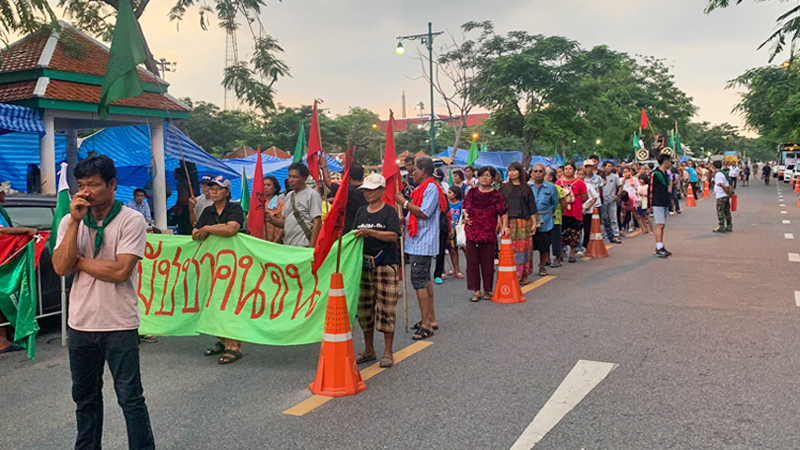Hundreds of indigent Thais from across the kingdom gathered for a 16th day today in front of the Government House to renew demands they be compensated for lands lost.
Members of the Assembly of the Poor have gathered since Oct. 6 to renew long-standing demands for compensation for lands lost decades ago to hydro projects as well as protest land-use regulations they believe will lead to more evictions.
Representatives today said they were angered by a government decision to postpone a direct meeting scheduled for this morning.
“We feel like the agreement was not sincere and show that the bureaucrats are not truly interested in fixing our problems. They just want to lead us on and keep us waiting,” the group said in a Monday morning statement issued after it said the government had agreed to the meeting.
#สมัชชาคนจน pic.twitter.com/uOiE9WE2gT
— วิภาวดี (@JindaratNedsup1) October 20, 2019
The top issue for the rural Thais, who represent five regional groups claiming 35 grievances, is the long-running battle over compensation over several dam projects that led to mass evictions in the 1990s.
“I am here about the land I live and work on. They built the dam over it. I don’t want the dam, I don’t want the compensation – I just want my land back,” an unidentified man from Chaiyaphum province told reporters.
Thailand all but abandoned new dam construction due to community resistance to those past projects, according to NGO International Rivers, with communities still demanding that those built be removed.
Earlier this year, the cabinet approved nearly THB600 million (US$19.8 million) in compensation for farmers affected by the construction of the Rasi Salai Dam, which was finished in 1992 and no longer functions. Most compensation settlements have excluded people who lived or worked informally on the land.
Others are still protesting another nearby dam finished 25 years ago.
“I am here to talk about how the residents’ lands, where they make a living, were affected by the Hua Na Dam that was built by the government … We want compensation for our relocation. … There are about 300 of us here advocating for the Hua Na issue,” an unidentified woman from Si Sa Ket province told reporters.
Another issue is how new land-use laws for protected lands will affect their livelihoods.
“The newly declared national park zones infringe on the land where we live and make a living,” said a man representing 60 people from the northeastern province of Chaiyaphum. “People will be forced to move, causing them to suffer greatly, because that’s their livelihood. This has been a problem for a long time now, but the government is issuing a new law right now that will evict people soon,” he said.
The new or revised laws strengthen punishments for those encroaching on national park lands. Though there are concessions for those currently residing or working in such areas, critics say the new law imposes even stricter limitations and hands the fates of such people who’ve lived or worked on such lands over to the government.
An untold number of Thais living informally on land, sometimes for generations, have been evicted since the 2014 coup. Reclaiming public lands was a top priority of the ruling junta, whose policies continue under today’s military-backed government. Over the years, people have been evicted from national parklands, informal communities along Bangkok’s rivers and canals, as well as areas designated by the government for economic development.
Some protesters suggested the government find ways to share the land, saying they would be just as good – or better – stewards of it than the government.
Assembly representatives said they were marching due to the lack of response from the government but apologized for any traffic caused.
The Assembly of the Poor was founded in 1995 as a voice for the rural poor after previous dams led to the destruction of thousands of communities along the Mun River, according to a 2000 book by historian Chris Baker.
อยากดันข่าว #สมัชชาคนจน ขึ้นเป็น #ข่าวใหญ่ บ้างนะ แม้นว่าตอนนี้สังคม นอกจากว้อยซ์ ก็ไม่เห็นว่าจะมีสื่อช่องไหนที่ออกข่าวในกรณีนี้เลย นี่คือยุคมืดหรอหรืออะไร พวกเขาต้องการความเป็นธรรมกลับคืน ทำไมถึงต้องมีอำนาจมืดมาปกปิดข่าวนี้ด้วย ช่วยๆกันนะ หวังว่าข่าวชุมนุมนี้จะได้ออกสื่อบ้าง pic.twitter.com/g4oRseC9yX
— 국민 메모리 🐰🐥 (@Kk_amyl) October 20, 2019
ขอพื้นที่แท็ก #มาลีสวยมาก อยากให้ทุกคนสนใจข่าว #สมัชชาคนจน พวกเขาดั้นด้นเข้ากรุงเพื่อเรียกร้องรัฐบาลช่วยเหลือด้านการทำมาหากิน ประท้วงอยู่ข้างทำเนียบมา 2 อาทิตย์แล้ว นัดเจรจากี่ครั้งก็เบี้ยวตลอด ล่าสุดวันนี้จะเคลื่อนไหวก็โดนตำรวจแจ้งข้อหา อยากให้ข่าวนี้แมส pic.twitter.com/ej794kBfWi
— จับโป๊ะ พปชร #สมัชชาคนจน (@PracharathSoBad) October 21, 2019
#สมัชชาคนจน
รัฐบาลยกเลิกนัดหมายการเจรจาในช่วงเช้าของวันนี้ และได้เปลี่ยนเวลาไปเป็นช่วงบ่าย ทำให้พวกเรารู้สึกผิดหวังกับท่าทีของรัฐบาลที่ทำให้ดูเสมือนว่าไม่มีความจริงใจและความตั้งใจในการแก้ไขปัญหา แต่กลับมีเจตนาที่จะยื้อเวลาออกไป pic.twitter.com/z8OuQBO099— kanok— (@adaywithfreedom) October 21, 2019
Related:
‘Khlong Toei slum must be erased,’ official says
Forced out for new mall, Bangkok’s poorest fear life after Khlong Toei
Khlong Toey In 60 Seconds | Coconuts TV
Gov’t Giveaway? Telecoms to use public fibernet to bring Wi-Fi to rural Thais




